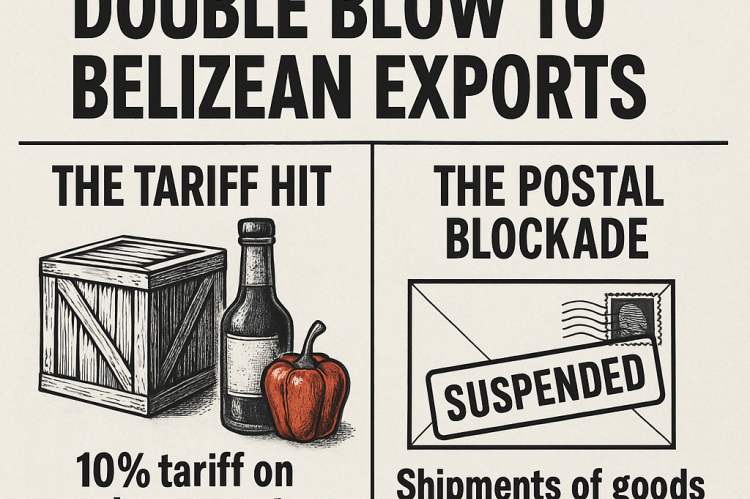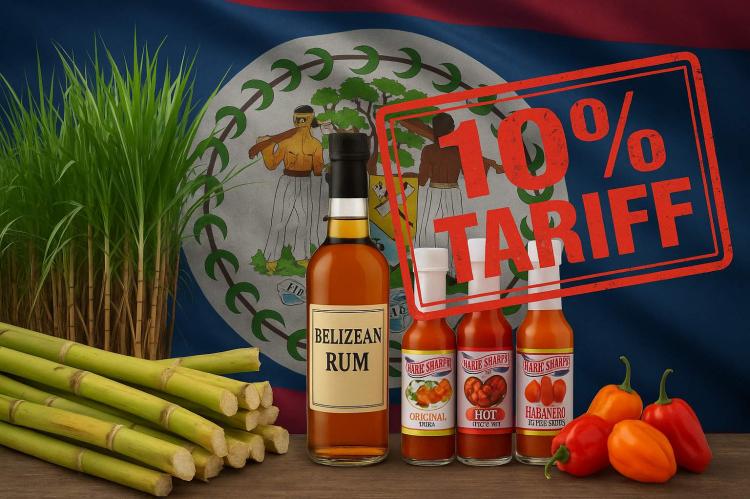Tariff Trap Tightens: From Cane Fields to Post Offices, Belizeans Pay the Price of U.S. Trade Shocks
By: Omar Silva I Editor/Publisher
National Perspective Belize: Digital 2025
BELIZE CITY –Thursday 28th August 2025: Belize’s fragile export economy has been hit with a one-two punch that threatens to squeeze both large industries and small entrepreneurs at the same time.
Just days after Washington imposed a 10% tariff on Belizean exports—a blow felt most in sugar, rum, and pepper sauces—a new U.S. Executive Order has brought the Belize Postal Service to its knees. Effective August 29th, the United States scrapped its long-standing duty-free threshold on low-value packages. All shipments, no matter how small, must now pay customs duties from the very first dollar.
The result: the suspension of all goods shipments from Belize to the U.S., cutting off small businesses from their most important overseas customers.
The First Hit: Tariffs on Bulk Exports
Sugar remains Belize’s single most significant agricultural export to the U.S., with 2024 shipments valued at US $24.1 million. A 10% tariff shaves US $2.4 million off the top, eroding already tight profit margins. Pepper sauces—an industry worth over US $4 million in exports—face losses of nearly US $400,000, while rum exports, conservatively estimated at US $10 million, could see US $1 million vanish overnight.
Together, the tariff alone threatens a US $3.8 million hit to Belize’s foreign exchange earnings—money the country cannot afford to lose.
Minister of Foreign Trade Francis Fonseca admits Belize is “concerned,” pointing to efforts through CARICOM to secure a waiver under the Caribbean Basin Initiative. But for now, the duty is real and biting.
The Second Hit: Postal Shipments Suspended
If tariffs hit the big producers, the postal suspension is strangling small and medium-sized businesses.
The Belize Postal Service confirmed it has halted all shipments of goods to the U.S., citing the impossibility of collecting and clearing duties on behalf of U.S. Customs. Only gifts under US $100 and documents remain exempt.
For micro-exporters, this is devastating. Skincare brand CocoLove Belize lamented on social media:
“This is a hard post to write. Today we found out that we can no longer ship to the USA due to new restrictions. This means we won’t be able to serve our U.S. customers, just as we were preparing to launch our website.”
Entrepreneurs like Khadija Assales of Kaj Expressions and Andrea Rodriguez of Kuchriments echo the same frustrations: costs of postage have already tripled this year, and with duties now front-loaded, their U.S. sales base will collapse.
For many, the Post Office was the only affordable option to reach U.S. customers. “It was the lifeline,” Rodriguez explains. “Now it’s just gone.”
The Broader Fallout
What we are witnessing is nothing short of a trade chokehold:
- Bulk exports like sugar and rum are penalized at the port.
- Small parcels and e-commerce are blocked at the post office.
Belize is left doubly exposed. Buyers in the U.S. may shift to cheaper alternatives, while Belizean entrepreneurs—many of them women and youth—are being forced to abandon years of work building international customer bases.
Informal courier channels through Mexico and Guatemala will inevitably grow, but these raise costs, risks, and informality.
A Regional and Global Problem—But Belize Suffers More
This U.S. policy applies worldwide. Postal operators from Japan to Mexico to Australia are scrambling. But for Belize, a nation whose export earnings barely pass US $80 million to the U.S., the shock is crippling.
Without leverage in Washington, Belize can only lobby through CARICOM and the Universal Postal Union. But for now, the effect is the same: our nation’s producers—from cane farmers in Orange Walk to pepper sauce bottlers in Stann Creek—are left stranded.
The Way Forward: Latin America and the Caribbean
This crisis must be the breaking point for Belize’s over-reliance on the United States. The answers lie closer to home:
- Mexico: With tariffs on Belizean agricultural products recently lifted, Mexico offers a natural, proximate market for sugar, seafood, and processed foods.
- Central America: Expanding partial scope agreements with Guatemala and beyond could provide new corridors for small exports.
- CARICOM: Duty-free access already exists, but Belize has failed to fully penetrate Caribbean markets for sugar, rum, and specialty foods.
- Infrastructure: Upgrading the Port of Belize and modernizing courier options are essential if Belize is to compete.
Belize must stop kneeling and begging for waivers in Washington and instead stand upright in Latin America and the Caribbean, where opportunities abound.
Conclusion
The U.S. has shown Belizeans, once again, the true cost of dependency. One executive order in Washington can paralyze both our cane fields and our post offices.
The choice is clear: either diversify and integrate with our Latin American and Caribbean neighbors, or remain at the mercy of a single market that dictates our survival.
From the sugarcane cutters to the pepper sauce bottlers, from the Post Office counters to the women entrepreneurs of Belize City—the time for sovereignty is now.
- Log in to post comments


